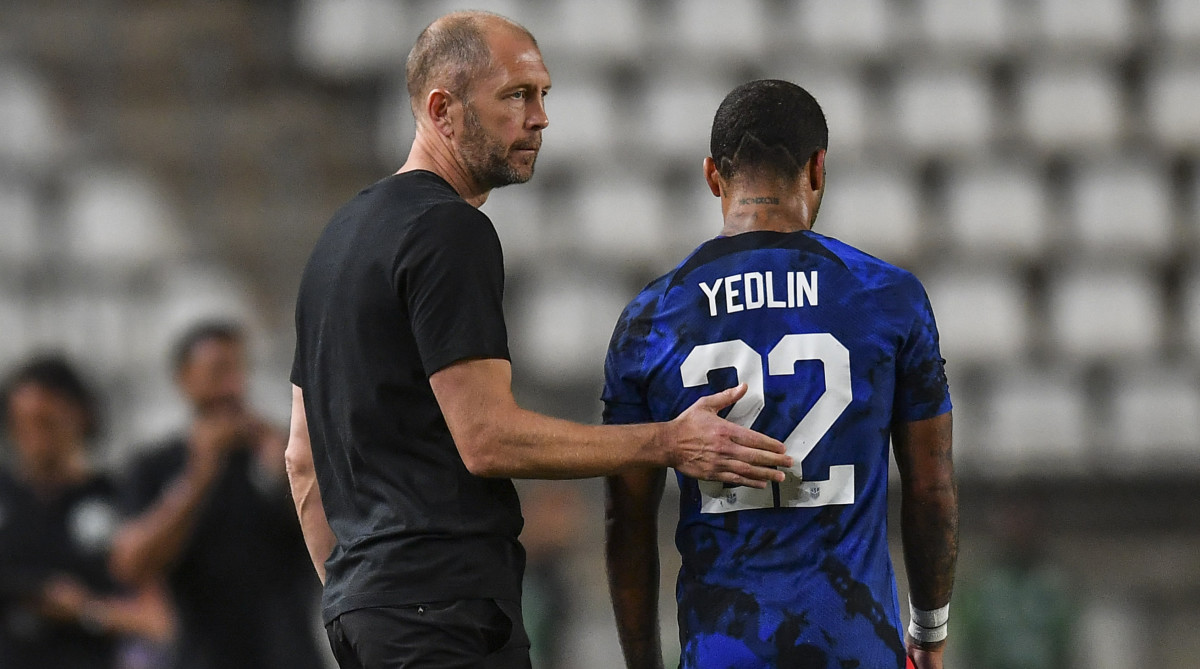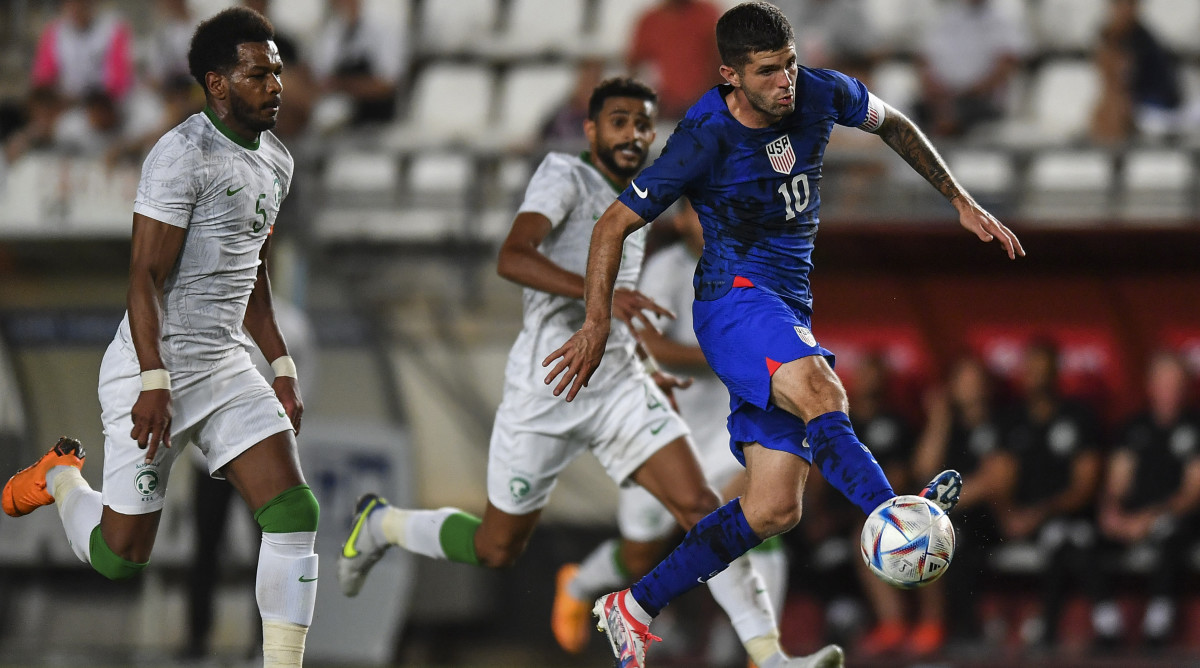USMNT Must Hope Poor Friendly Form Doesn’t Follow It to World Cup
The U.S. national team’s World Cup preparation ended quietly on Tuesday afternoon, both literally and figuratively, with an uneventful 0–0 draw against modest Saudi Arabia in an almost-empty Estadio Nueva Condomina in Murcia, Spain.
The next time the Americans gather, they’ll be in Qatar, with about a week to prepare before the World Cup opener against Wales on Nov. 21. The results during this month’s international window, which began with a dreadful 2–0 loss to Japan last Friday, will be forgotten. But coach Gregg Berhalter and the men who make his World Cup squad will have to hope that this pair of uninspiring outings aren’t a sign of things to come.
Immediately after Tuesday’s tie, Berhalter suggested that waiting for the World Cup might be more difficult than playing in it.
“It’s nervy times. People are worried about being on the roster or not, and it’s a difficult moment,” he told Fox. “But having said that, we just need to go out and play together. The confidence isn’t there yet, but we’ll get there.”
Since sealing its World Cup spot at the end of March, the U.S. has gone 2-1-3 across six games and was shut out in three. The Americans registered only two shots on target against Japan and Saudi Arabia combined—both on Tuesday. Berhalter seems no closer to solving his dilemma up front—none of the strikers called up this month distinguished themselves—while the Americans struggled to combine and create chances against both Japan’s vigorous press and Saudi Arabia’s lower block.
“I still think we’re not as confident as I’d like,” Berhalter said. “We’re playing tentative and you can see, the connections are not there like we want … I can’t fault the effort but we need to keep improving.”
Absent its primary attackers, the 53rd-ranked Saudis played a rough, defensive game that didn’t challenge the U.S. during its buildup but did ask questions of the Americans’ ability to find space in against a deeper, more compact opponent. Wingers Christian Pulisic and Gio Reyna started in the same game for the first time since the Concacaf Nations League final 15 months ago. Ricardo Pepi was deployed up front. The Americans were willing to try longer balls over the top or toward the corner to try to spread the Saudis, while midfielder Weston McKennie made several attacking runs from deeper areas. But play remained slow overall, Pepi was a non-factor and breakdowns in U.S. execution were frequent. Reyna wound up exiting at the half-hour mark with muscle tightness, a few minutes after Tyler Adams barely missed from long range. That was the best chance of the first half.

Jesús Ferreira, perhaps the favorite to start at striker in Qatar, replaced Pepi in the 59th and had a good look a few seconds later after turning quickly on a smart feed from Paul Arriola. But Ferreira shot straight at the Saudi goalkeeper. The spotlight on U.S. strikers was bright this month, especially after Berhalter decided to omit his most in-form forward, Union Berlin’s Jordan Pefok. In the end, Pefok may have bolstered his chances simply by staying home. It remains to be seen whether Berhalter believes Pefok is a tactical fit.
“It was tough,” Berhalter told Fox when asked to assess his forwards. “Jesús came on and got a couple chances. It was tough for Ricardo. He didn’t get much service. He didn’t get many chances. It’s really hard to evaluate players when they’re not getting opportunities.”
Following the April draw, the World Cup’s Group B was recognized as perhaps the tournament’s tightest because its members had the highest average FIFA ranking. A few months later, as each of the four sides faces questions of momentum or continuity, it may be the most wide open.
In addition to the Americans’ less-than-convincing display this month, neither England nor Wales is in World Cup form. The Welsh are 0-4-1 over their past five games, 2-5-2 this year and just suffered relegation from UEFA’s Nations League A. England is also going down after an 0-3-3 stretch that ended with Monday’s 3-3 draw with Germany, during which the Three Lions blew a late lead and scored their first goal from open play in more than eight hours of game time. Iran, meanwhile, changed coaches just three weeks ago, re-appointing Carlos Queiroz. The veteran Portuguese manager led Team Melli from 2011 to 2019 and replaced Dragan Skočić, who was fired in July despite guiding Iran to an 8-1-1 record in the final round of Asian World Cup qualifying.
Obviously, everyone would rather hit the ground in Qatar on some kind of roll. But USA-Wales is in 55 days, and plenty is going to happen before then that will diminish the disappointment of the past two games. Players’ form and fitness will rise and fall, and the U.S. could look quite different in Qatar. Berhalter said this week that as many as five potential starters were unavailable over the past week-plus, among them midfielder Yunus Musah (who was watching in Murcia), winger Tim Weah and left back Antonee Robinson. The World Cup very well could wind up being a snapshot of a moment in time, not necessarily the fair or predictable end-product of the national team’s long-term trajectory.

“In a perfect world, I have it in mind,” Berhalter said Monday when asked if he could envision his starting XI in the World Cup opener. “But one thing I know is that’s not international soccer. So do I think we have the best players in each position identified? Yes. Do I think they’re all going to be available for the start of the World Cup? I don’t know. That’s just what every international manager will be dealing with right now, We’ll be holding our breaths hoping that’s the case.”
And if the Americans’ performances against Japan and Saudi Arabia revealed genuine, fundamental flaws that’ll hurt them come November, Berhalter isn’t the type to scrap tactics and chemistry he’s been building for two years on short notice. The next few weeks may make their mark on his ultimate 26-man roster, but they won’t change the team’s identity. The U.S. is what it is, for better or worse. Berhalter isn’t going to blow it up, and so has little choice but to hope that the tentative displays against Japan and Saudi Arabia were a reflection of timing, and not the team.
“This camp is done and when we get to Qatar, be at ease,” Berhalter said when asked about his message to his group. “This is the team. The team’s not changing after that, and we need to play our game and play with confidence.”
More Soccer Coverage:
